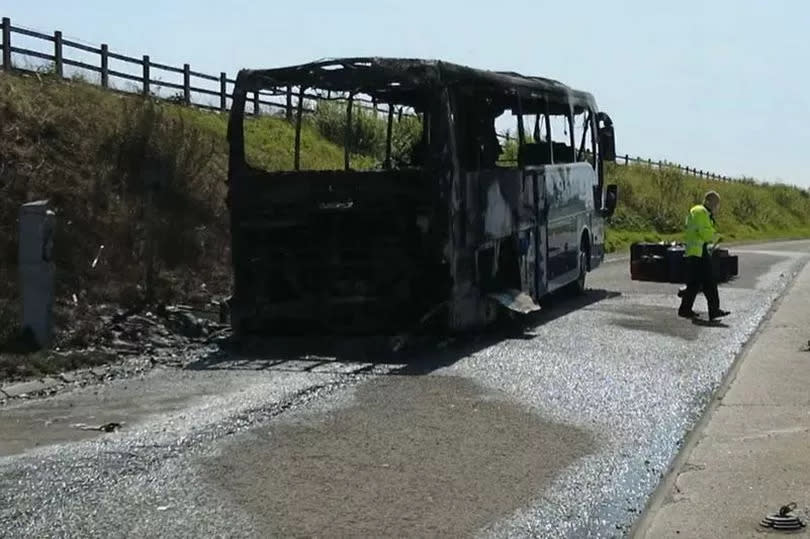Cornwall buses 'a Grenfell disaster waiting to happen' after recent fires

Bus safety campaigners in Cornwall fear passengers will die in a horrific bus fire if improvements to the whole fleet are not made. After years of campaign for improved bus and coach safety, the Driver and Vehicle Standards Agency (DVSA) announced last autumn that it would launch a study to “better understand the root causes of bus fires” and reduce such outbreaks.
The investigation came as pressure has been mounting to understand why there have been so many bus and coach fires in Cornwall and in the rest of the UK too, with unions and campaign groups insisting the fleet of coaches and bus on British roads are a danger to passengers and it is only a matter of time before passengers die.
The call for a root and branch investigation has now been carried out by the DVSA and found that many incorrect repairs and drivers continuing to drive despite warning systems advising them to stop have been behind buses and coaches heating up and catching fire.
Read next: A30 coach destroyed in blaze after passengers evacuated
The DVSA report comes as the A38 was shut near Doublebois in June when a bus caught fire and only this week, it was the A30 which had to be closed while firefighters dealt with another bus burst into flames with passengers on board between Bodmin and Launceston.
It found that there were 242 bus fires nationally between January 2020 and the beginning of 2023. Of those, 29 were caused by engine failure, another 29 by poor maintenance, 38 by an electrical fault, 46 from a component fault, six from arson, six from a fuel leak with another 88 fires where the operator was unable to identify the cause.
Get the best stories delivered to your inbox every day. Choose what you want here
The report also put the blame largely at the door of drivers for continuing to drive when the engine warning lights come on telling them to stop.
The DVSA report said: "We found that drivers have driven vehicles with warning systems telling them not to. We also found that drivers have driven vehicles under instruction from the depot with warning systems telling them not to or have not always been clear on the evacuation procedures for the particular vehicle they are driving.
"Our report shows that drivers may not take the correct action at the start of a thermal incident." It added: "Drivers must understand the warning systems on the bus before they start any journey. They must know how to use emergency equipment in the event of a thermal incident. They must be trained and know the procedures for safe evacuation of passengers on the bus they are driving. Operator staff should not assume the driver has sufficient technical knowledge to ignore warning systems which advise to stop the vehicle."
Cornwall-based Rail, Maritime and Transport union rep Barry West, who launched a bus fire safety campaign six years ago, said there seems to be three bus fires a month occurring in the UK. He said that for the DVSA to blame mainly drivers when they are under enormous pressure from their employers to keep to a schedule is unfair when he says most buses contain materials banned in the construction of trains, planes and public buildings.
He said: "It is as if we are sleep walking into a Grenfell type scenario where the lives of many will be affected or lost and the Government and bus industry will look back and say lessons will be learned."
Barry added: "Bus fires are still are a serious safety concern and the evidence I have been able to collate demonstrate that there are a significant number of bus fires occurring on an all too frequent basis. Many of the people who use buses are elderly, vulnerable and disabled. So the risk to them is likely to be increased as safe evacuation is at times more complex and timely.
"The DVSA have been all too quick to apportion blame on drivers, instead of focusing on the root causes or understand the behaviour of those who are frequently instructed to continue driving by their employers despite reporting faults.
"The materials used in the construction of buses are banned in public buildings, planes and trains I understand from reading eminent fire safety reports from professor Guillermo Rein. So there is more work to do and legislation to review and change so that that Important improvements to the design and construction of buses are safer in the future."
He added: "Unfortunately there are many buses and coaches in circulation that have been in service for 15 years plus so it will take more than a generation to realise the benefits in many cases."
The DVSA said it is keen to continue its collaborative work with operators and drivers to improve the safety and reliability of bus services.

 Yahoo News
Yahoo News 
